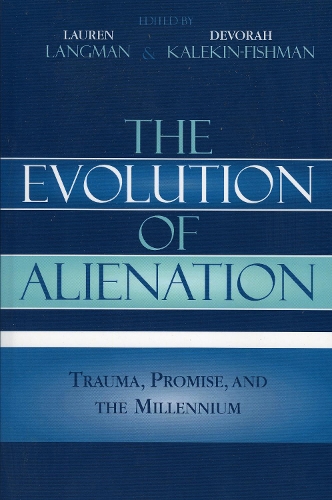
The Evolution of Alienation: Trauma, Promise, and the Millennium
(Paperback)
Publishing Details
The Evolution of Alienation: Trauma, Promise, and the Millennium
By (Author) Lauren Langman
Edited by Devorah Kalekin-Fishman
Contributions by Chip Berlet
Contributions by Harry F. Dahms
Contributions by Matthew David
Contributions by Rick Gibson
Contributions by Martha Gimenez
Contributions by Karen Halnon
Contributions by Douglas Kellner
Contributions by Lauren Langman
Bloomsbury Publishing PLC
Rowman & Littlefield Publishers
18th November 2005
United States
Classifications
Tertiary Education
Non Fiction
Popular culture
302.544
Physical Properties
Paperback
332
Width 212mm, Height 302mm, Spine 23mm
526g
Description
The Evolution of Alienation: Trauma, Promise and the Millennium presents a collection of essays that examine the prevalence of alienation in the contemporary world. Although the authors share a critical approach to society, their views of alienation vary. While some feel that alienation is inescapable under the conditions of late modernity, others see that especially at this time there are opportunities to overcome alienation. Testing their approaches, the authors touch on highly diverse domains of life. The book is divided into four sections, each with a focus on how alienation is produced and, perhaps, overcome. Part I presents theoretical approaches to 'shifting views of alienation'. Here the authors discuss how alienation is disclosed in social science, in technology, and in biological constructions of the human being. Part II deals with political consequences of alienation. The three chapters focus on how alienation can lead to fascist beliefs, how it functions in the development of authoritarian personalities, and how alienation is disclosed in teen-age violence, but also in the justice meted out to desperate teens, without compassion. Part III includes examinations of 'alienation in identity, culture, and religion'. Here, researchers discuss how the alienating conditions of globalization create alienated identities that are carnivalized in shock music and in exploitative television shows. The last chapter of this section sees in these developments evidence of our inability or unwillingness as social scientists to deal with transcendental values. Part IV focuses on phenomena from everyday life, showing how alienation undermines the advantages of community, and the intimacies of dialogue. Although the very concern with alienation shows awareness of trauma, there are, throughout the book, hints of promise - in technology, in loving and creative domesticity, in activism and through grass-roots initiatives in education. Through an interest in the cosmos human being may yet discover the way out of alienating labyrinths.
Reviews
The Evolution of Alienation takes account of the postmodern debate and the rejection in recent years of the concept of alienation, critiques that rejection, and makes a strong argument for the relevance for today of a broader, more cultural concept of alienation. This is a strong collection, broad in nature and with scholarly depth, that should appeal to a wide audience while also finding use in undergraduate and graduate courses in theory, social problems, and other core areas of sociology. -- Kevin B. Anderson, Purdue University
For anyone who believes 'alienation' refers to the disempowering awareness of being an outsider in a society where everyone else acts as if they belong. This fine collection argues persuasively that it is the society that doesn't 'belong', and that 'alienation' plays a crucial role in helping us to understand why, and, with a little help from our friends, to exchange our alienating society for something far better. HIGHLY RECOMMENDED. -- Bertell Ollman, New York University, and author of Alienation: Marx's Conception of Man in Capitalist Society
Author Bio
Devorah Kalekin-Fishman is a senior researcher at the University of Haifa in Israel. Currently a member of the Executive of the International Sociological Association, she is past president of the ISA committee for Alienation Research and Theory. Dr. Kalekin-Fishman is the editor of the International Sociology Review of Books and serves on the editorial boards of Current Sociology, Intercultural Education, and the Mediterranean Journal of Educational Studies. Recent publications include a critical analysis of Ideology, Policy, and Practice: Education for Immigrants and Minorities in Israel (Kluwer) and an edited volume, Designs for Alienation: Exploring Diverse Realities (Finland: SoPhi Press). Lauren Langman is a professor of sociology at Loyola University of Chicago. He is past chairman of the Marxist Sociology of American Sociological Association and current President of Alienation Research and Theory, of the International Sociological Association. His recent publications include a special issue of American Behavioral Politics devoted to the presidency in a television age, the social psychology of nationalism for the Handbook of Nationalism, and alternative globalization movements in Sociological Theory.
